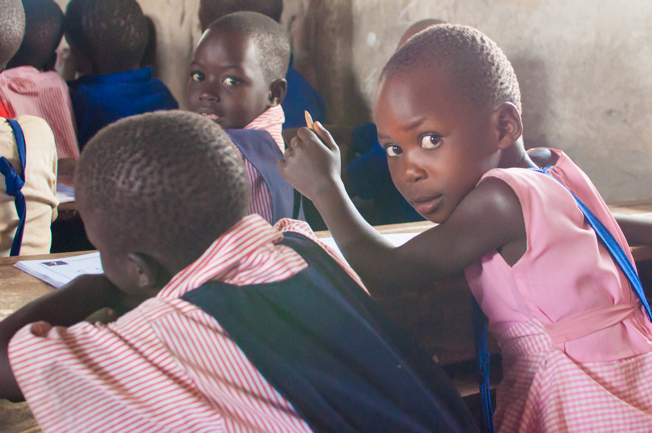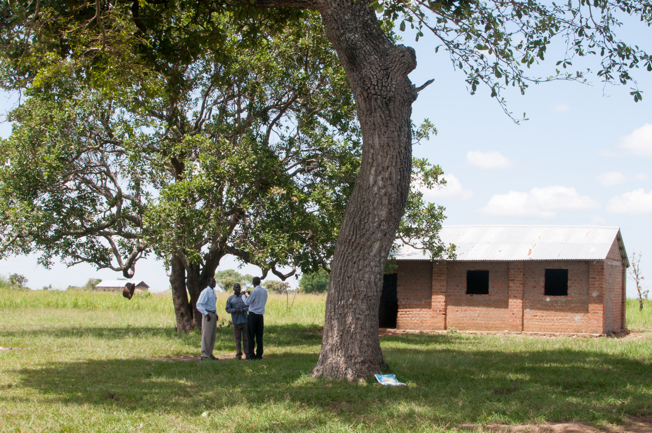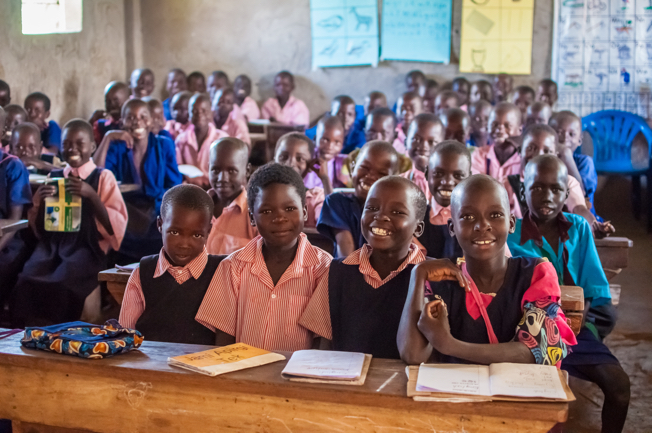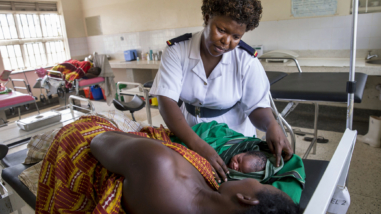Thomas is a second grade teacher at Okum Primary School, an hour’s drive from Lira in northern Uganda. Each day, he and his co-teacher, Jacqueline, have the responsibility of teaching 120 second graders how to read, write, and calculate, among other skills they’ll need to prepare themselves for a bright future. Next door their colleague Catherine has the same responsibility for more than 100 first graders.
Across northern Uganda, less than a third of all children in third to seventh grade are able to read a short story in Leblango, the language they speak at home. In other words, most of the older brothers and sisters of the children in these classrooms are failing to learn.

When I visited at the end of June, it seemed that things might turn out differently for the students in Thomas, Catherine, and Jacqueline’s classes. Thomas’s second graders were ably reading a story about trains. Catherine’s first graders were perfecting the shape of the letter “k” on their slates. The teachers told me that the students in these first and second grade classes could already do more than their peers in third grade. Same community. Same school. So what accounts for the difference?
Part of the difference comes from the fact that the teachers have all been getting training, materials, and regular support for teaching reading from Mango Tree, one of the Foundation’s grantees. They told me that the method gives them a simplified set of steps to follow that make it easier for children to learn. Though there is still a lot of work for them as teachers, they told me that “sincerely it is hard, but it is good.”

Indeed, there are a great many things that make the work for teachers like Thomas, Jacqueline, and Catherine difficult. First, they have over 100 children to care for in their classrooms. On top of that, roughly 10% of their students have transferred in from another school and 25% are absent on any given day—at home sick or caring for a younger sibling. And many parents are unable or unwilling to supply their children with the notebooks and pencils that they need to participate fully in class. Teaching children to read under these circumstances is a daunting task indeed. But the fact that 43% of children in Uganda graduate fifth grade without being able to read is inexcusable. Children deserve better from their schools. And getting better results for these students means grappling with the root causes of the failure.
One line of thinking suggests that the problem boils down to teacher skill—teachers simply do not know how to effectively teach reading. Another line of thinking boils down to teacher will—teachers don’t bother to show-up and teach often enough. In fact, data from the World Bank’s Service Delivery Indicators Project (also funded by the Foundation) suggest that both are a problem. Only 19% of Ugandan teachers have themselves mastered the content in the curriculum up to grade four. A quarter are absent from school and half are in school but absent from the classroom during teaching hours at any given time.
But have we thought carefully enough about the interplay between will and skill? When teachers are insufficiently equipped to be effective in the classroom, can they sustain the motivation to keep showing up?

Mango Tree’s work is making a difference because it gives teachers good ideas for how to teach reading and materials that support them in that task. It is well-calibrated to the classroom environment that teachers actually deal with on a daily basis. I suspect it is also making a difference because a Mango Tree staff member visits the class regularly to help troubleshoot problems teachers are facing. Teachers have access to mentors and thought partners who can help them improve their teaching. As Mango Tree helps teachers develop more skills in teaching reading, they may very well be cultivating greater teacher will to put in the effort it takes to ensure their students succeed.
Researchers from the University of Illinois are conducting a randomized evaluation that will contribute to our understanding of how much of a difference the Mango Tree literacy program is making in schools in northern Uganda. And as part of their research, they are exploring how variances in the approach to teacher training and support affect the impact of the program, which we hope will provide clues about how to best to support teacher skill and will in the service of better outcomes for children across Uganda. We’ll share the results of the evaluation when the researchers complete their work. Stay tuned!

For more photos from this trip, see Dana’s Flickr album Northern Uganda (June 2015) – Ed.



